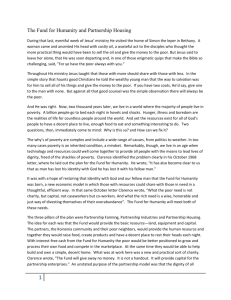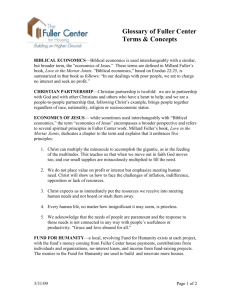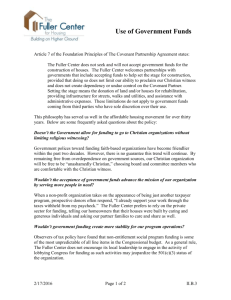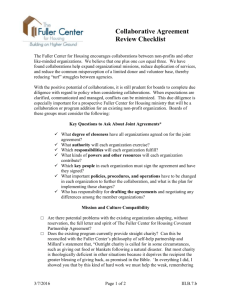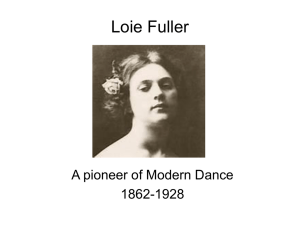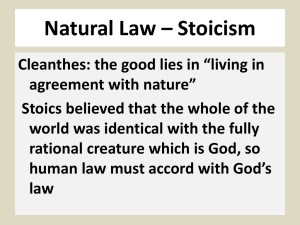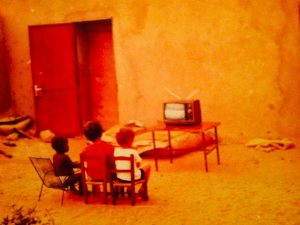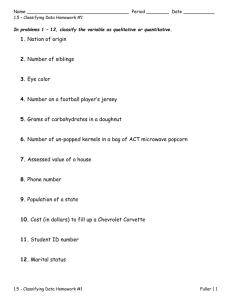Foundational Concepts - The Fuller Center for Housing
advertisement
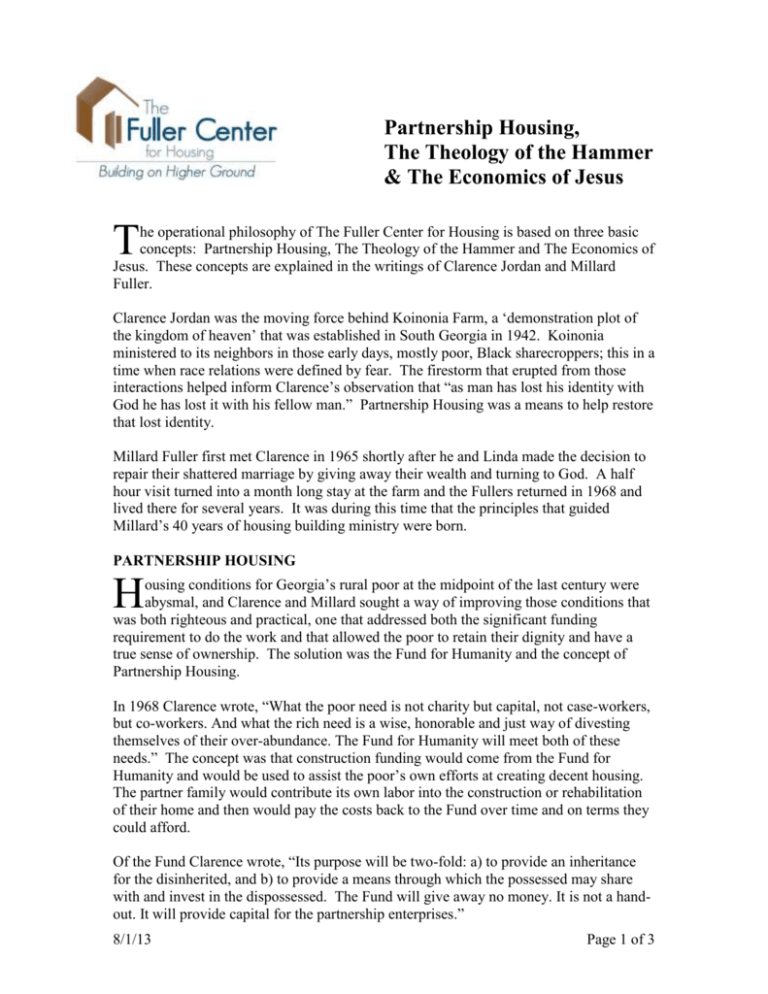
Partnership Housing, The Theology of the Hammer & The Economics of Jesus T he operational philosophy of The Fuller Center for Housing is based on three basic concepts: Partnership Housing, The Theology of the Hammer and The Economics of Jesus. These concepts are explained in the writings of Clarence Jordan and Millard Fuller. Clarence Jordan was the moving force behind Koinonia Farm, a ‘demonstration plot of the kingdom of heaven’ that was established in South Georgia in 1942. Koinonia ministered to its neighbors in those early days, mostly poor, Black sharecroppers; this in a time when race relations were defined by fear. The firestorm that erupted from those interactions helped inform Clarence’s observation that “as man has lost his identity with God he has lost it with his fellow man.” Partnership Housing was a means to help restore that lost identity. Millard Fuller first met Clarence in 1965 shortly after he and Linda made the decision to repair their shattered marriage by giving away their wealth and turning to God. A half hour visit turned into a month long stay at the farm and the Fullers returned in 1968 and lived there for several years. It was during this time that the principles that guided Millard’s 40 years of housing building ministry were born. PARTNERSHIP HOUSING ousing conditions for Georgia’s rural poor at the midpoint of the last century were abysmal, and Clarence and Millard sought a way of improving those conditions that was both righteous and practical, one that addressed both the significant funding requirement to do the work and that allowed the poor to retain their dignity and have a true sense of ownership. The solution was the Fund for Humanity and the concept of Partnership Housing. H In 1968 Clarence wrote, “What the poor need is not charity but capital, not case-workers, but co-workers. And what the rich need is a wise, honorable and just way of divesting themselves of their over-abundance. The Fund for Humanity will meet both of these needs.” The concept was that construction funding would come from the Fund for Humanity and would be used to assist the poor’s own efforts at creating decent housing. The partner family would contribute its own labor into the construction or rehabilitation of their home and then would pay the costs back to the Fund over time and on terms they could afford. Of the Fund Clarence wrote, “Its purpose will be two-fold: a) to provide an inheritance for the disinherited, and b) to provide a means through which the possessed may share with and invest in the dispossessed. The Fund will give away no money. It is not a handout. It will provide capital for the partnership enterprises.” 8/1/13 Page 1 of 3 Partnership Housing represents a three-party agreement among the poor, the wealthy and the Fund for Humanity (represented by the local Covenant Partner). Each party agrees to accept certain responsibilities: The wealthy agree to divest themselves of their overabundance, contributing of their resources to capitalize the construction and rehabilitation of houses; The poor agree to be full partners in the process, contributing sweat equity in the construction work and then paying the costs on terms they can afford, over time and with no interest charged or profit made; The Fund for Humanity facilities the process, distributing the funds made available by the wealthy and receiving the payments made by the new homeowners, which is then used for the construction of ever more houses. THE THEOLOGY OF THE HAMMER n 2008 Millard described the Theology of the Hammer as, “the understanding that our Christian faith mandates that we do more than just talk about faith and sing about love. We must put faith and love into action to make them real, to make them come alive for people. Faith must be incarnated; that is to say, it must become more than a verbal proclamation or an intellectual assent. True faith must be acted out. The Theology of The Hammer means that we work hard until a house for a needy family is built or renovated. It means continuing to love and having concern that is shown to the family to ensure success as a new homeowner. I This theology is also about bringing a wide diversity of people, churches, schools, businesses and other organizations together to build and renovate houses and establish viable, dynamic communities. It acknowledges that our political, philosophical and theological differences exist, but we can all find common ground using the hammer as an instrument of God’s Love.” THE ECONOMICS OF JESUS In that same letter Millard wrote, “The biblical economic lessons that we call “The Economics of Jesus” teach us that we can all agree on the following: 1. Building and renovating simple decent, affordable houses with and for people in need is right and central to proclaiming God’s love; 2. We should do this utilizing principles that are found deeply rooted in many religious traditions of the world: Not making a profit off the poor Not charging interest to the poor (Exodus 22:25) Taking what limited resources are available, asking God to bless them, then going to work, proceeding with the knowledge that God’s love extends to everyone, with a preferential concern for the poor, the broken and the stranger. Acknowledging that the opportunity for service and divestment of wealth is a blessing to people in need and to the giver.” 8/1/13 Page 2 of 3 FOUNDATIONAL PRINCIPLES These basic tenets are expressed in The Fuller Center’s foundational principles, which are found in the Partnership Covenant. The building and restoring of houses is done under the direction of the Covenant Partner, a local organization of volunteers who raise funds, select and nurture partner families, oversee the construction work, and receive the house payments into their local Fund for Humanity to be used for more house building. The Covenant states that: 1- The Fuller Center seeks to demonstrate the love and teachings of Jesus Christ to all people. While The Fuller Center is a Christian organization, it invites and welcomes volunteers, donors and others who are actively committed to The Fuller Center’s Mission, Method of Operation and Principles 2- The Fuller Center is a people-to-people partnership that brings families and communities in need together with volunteers and resources to build decent, affordable homes. The Fuller Center is committed to the development and uplifting of families and communities, not just the construction and rehabilitation of houses. 3- The Fuller Center and Covenant Partners build, renovate and repair simple, decent and affordable houses with people who are living in conditions that are inadequate and who are unable to secure decent housing by conventional means. 4- The Fuller Center selects homeowner families according to criteria that do not discriminate on the basis of race, creed, or ethnic background. All homeowners contribute “sweat equity”, meaning that they work hand-in-hand with the Covenant Partner and its volunteers to build or renovate their home. 5- The Fuller Center sells houses to selected families on terms they can afford, with no profit or interest charged. House payments are used for the construction or renovation of additional homes. 6- The Fuller Center is a global partnership. In recognition of and commitment to that global partnership each Covenant Partner is asked to contribute at least 10 percent of its cash contributions to The Fuller Center’s international work. Funds specifically designated by a donor for local work may be excluded from the tithe calculation. 7- The Fuller Center does not seek and will not accept government funds for the construction of houses. The Fuller Center welcomes partnerships with governments that include accepting funds to help set the stage for construction, provided that doing so does not limit our ability to proclaim our Christian witness, and does not create dependency or undue control on the Covenant Partner. Setting the stage means the donation of land and/or houses for rehabilitation, providing infrastructure for streets, walks and utilities, and assistance with administrative expenses. These limitations do not apply to government funds coming from third parties who have sole discretion over their use. 8- The Fuller Center supports the Greater Blessing Plan, which encourages beneficiaries of lower-cost home repairs or renovations to repay that cost over time on terms they can afford, but without a loan agreement. Gift “payments” are made monthly, providing the beneficiary the opportunity of receiving the greater blessing of giving, not just receiving. Additional information on The Theology of the Hammer, The Economics of Jesus and other aspects of this ministry can be found in The Theology of The Hammer, The House That Love Built, and Building Materials for Life Volumes I, II and III available at www.fullercenter.org 8/1/13 Page 3 of 3
